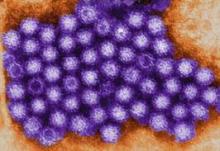A norovirus outbreak affecting a girls’ soccer team competing at an intrastate tournament was traced to a reusable grocery bag that held the team’s snacks, according to a report in the May issue of the Journal of Infectious Diseases.
The bag was stored in a hotel bathroom used by the index case when she developed vomiting and diarrhea, presumably from exposure to the pathogen before the tournament. "This investigation confirms the potential for aerosol contamination of fomites in norovirus outbreaks, which has long been suspected to contribute to persistent problems on cruise ships, in nursing homes, and in other settings," said Kimberly K. Repp, Ph.D., of Oregon Health and Science University, Portland, and William E. Keene, Ph.D., of the Oregon Public Health Division.
 Photo courtesy CDC/Charles D. Humphrey
Photo courtesy CDC/Charles D. Humphrey
This transmission electron micrograph (TEM) reveals norovirus virions, or virus particles. A positive strain of norovirus was traced to a reusable grocery bag holding snacks for a girls’ soccer team, sidelining a number of teammates and chaperones who became ill.
Dr. Repp and Dr. Keene investigated the outbreak to determine its scope and etiology. Although approximately 2,000 children from Washington and Oregon attended the weekend tournament in King County, Wash., the outbreak was confined to a single group of 17 Oregon girls aged 13-14 years and their 4 adult chaperones. The group shared hotel rooms and ate together at local restaurants.
The index case moved to her chaperone’s room when she became symptomatic, had vomiting and diarrhea throughout the night, and left for home with the chaperone in the morning. Thus, she had no contact with her teammates or other chaperones after symptom onset, and no direct contact with the grocery bag or the food it contained.
However, the bag of snacks was retrieved from the bathroom she used and brought to a different room, where it was handled by the team and other chaperones at lunch the next day. The reusable, open-top grocery bag was made from laminated woven polypropylene. The other members of the affected party removed from it chips and cookies that were in commercial sealed packages, as well as fresh grapes, and consumed them hours after the index case and the chaperone had left the area.
The chaperone who drove the index case home later became ill, as did six other girls and chaperones in the group, 36-57 hours later. All seven cases reported vomiting, and four reported diarrhea. The duration of symptoms was 1-7 days (median 3 days). There were no hospitalizations.
Illness was associated with a composite exposure to any item in the bag or the bag itself. It was impossible to pin down a more detailed chain of contamination because so many of these individuals passed all these items around among themselves.
Three stool specimens were obtained from people who became ill, and all were positive for the same strain of norovirus. Two of 10 swabs taken from the grocery bag 2 weeks after the incident also were positive for that strain of norovirus.
"The data indicate that virus aerosolized within the hotel bathroom settled upon the grocery bag and its contents, and it was touching the bag and consumption of its contents that led to the outbreak," Dr. Repp and Dr. Keene said (J. Infect. Dis. 2012;205:1639-41 [doi: 10.1093/infdis/jis250]).
No other attendees at the tournament, patrons at the hotel or restaurants, or staff members reported any gastrointestinal illness.
"Although we certainly recommend not storing food in bathrooms, it is more important to emphasize that areas where aerosol exposures may have occurred should be thoroughly disinfected; this includes not only exposed surfaces but also objects in the environment that could serve as fomites," the researchers added.
"We also recommend that persons with responsibilities for cleaning (e.g., housekeeping staff or family members) be informed about incidents of vomiting or diarrhea and best practices for disinfection," they said.
Dr. Repp has since moved to the Washington County (Ore.) Department of Health and Human Services. This work was supported by the National Institutes of Health and the Centers for Disease Control and Prevention (CDC). Neither Dr. Repp nor Dr. Keene reported any relevant financial conflicts of interest.

